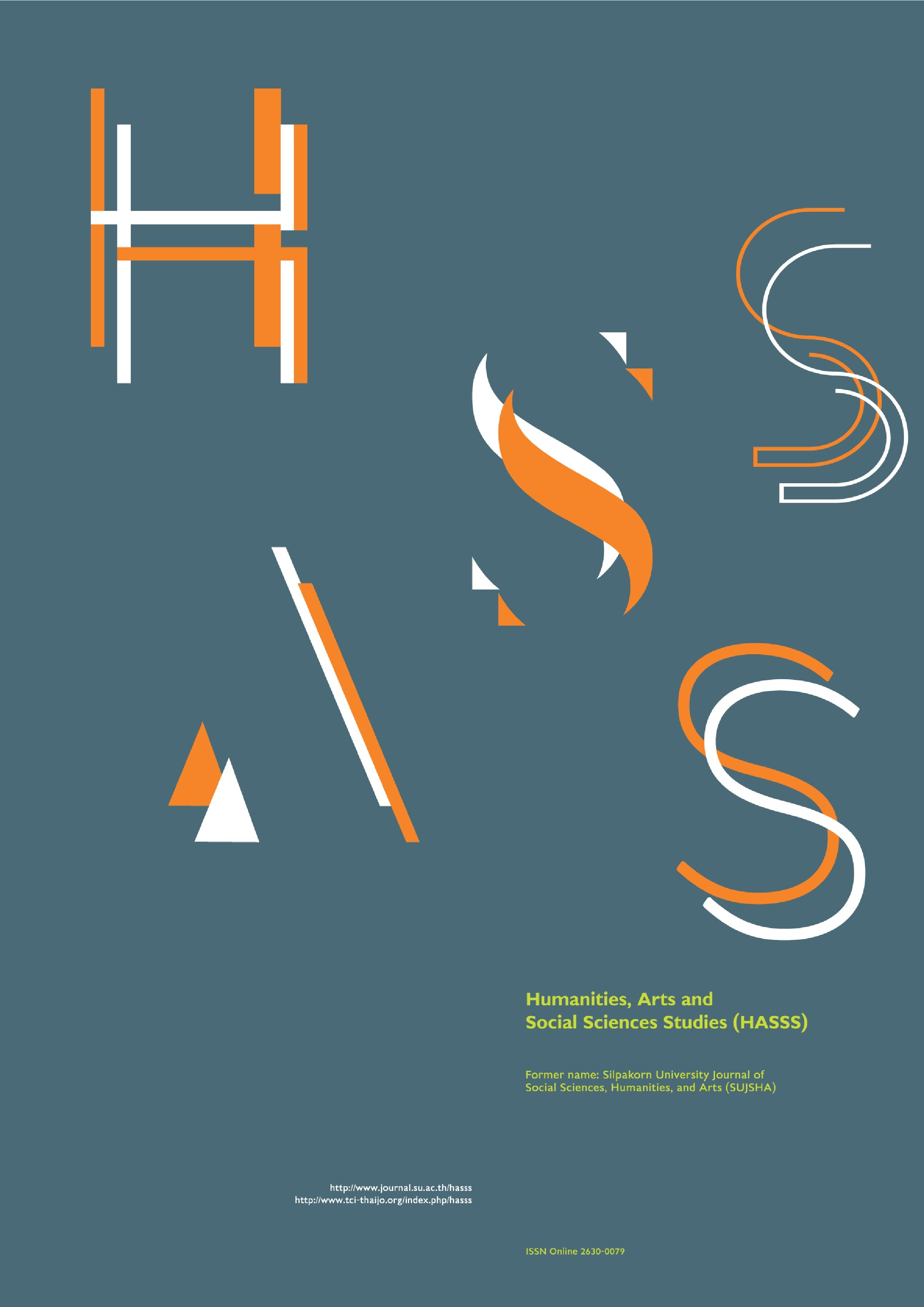Analysis on projects of conscientization in accordance with exclusion-based approaches and CCPR model
Main Article Content
Abstract
In today's society, educators are challenged to provide quality education that enables learners to achieve their goals to be able to solve problems during a disruptive era. This research illustrates that it is important to examine learners’ thinking processes to enable them to distinguish right from wrong and make informed decisions. The objectives of this research were 1) to analyze the projects of conscientization thinking of students at King Mongut’s Institute of Technology Ladkrabang Prince of Chumphon who enrolled in an Integrated Thinking course and 2) to study how assigned video clips affect conscientization among the target learners. The students produced video clips according to the principle of enhancing conscientization. This coding media was later distributed to the target learners, which initiated the process of conscientization. Sixteen video clips were used as the units of analysis. A content analysis form was used as the data collection tool. Observation and frequency analysis of content were used to collect qualitative data. Content and descriptive analysis techniques were employed in the data analysis; and an investigator triangulation method was used for validity confirmation. The results of this research indicated that the sixteen video clips aligned with Paulo Freire's process of enhancing conscientization. Therefore, after viewing the video clips, the target learners responded with conscientious feedback. In conclusion, only one coding and decoding process is needed according to Paulo Freire's approach to teaching thinking.
Downloads
Article Details

This work is licensed under a Creative Commons Attribution-NonCommercial-NoDerivatives 4.0 International License.
All rights reserved. Apart from citations for the purposes of research, private study, or criticism and review,no part of this publication may be reproduced, stored or transmitted in any other form without prior written permission by the publisher.
References
Bloom, B. S., Englehart, M. D., Furst, E. J., Hill, W. H., & Krathwohl, D. R. (1956). The taxonomy of educational objectives, handbook I: The cognitive domain. Longmans, Green.
Boone, E. J. (1992). Developing programe in adult education. Prentice Hall.
Boyle, P. G. (1981). Planning better programs (2nd ed.). McGraw-Hill College.
Denzin, N. K. (2017). Sociological methods: A sourcebook. Routledge.
Department of Mental Health, Ministry of Public Health. (2003). Khumue songsoem sukkhaphapchit nakrian radap matthayomsueksa samrap khru [Teacher’s handbook of mental health promotion for secondary education students]. Ministry of Public Health, Thailand. [in Thai]
Faculty of Communication Arts, Rangsit University. (2016). Khrongkan kanchattham mattrathan chariyatham lae kanphalit raikan thorathat samrap dek yaowachon lae khropkhrua [The codes of conduct creation and the production of television program prototype for children, youths and family]. https://broadcast.nbtc.go.th/data/academic/file/600100000001.pdf [in Thai]
Freire, P. (1970). Pedagogy of the oppressed. Penguin Education.
Kamsom, K. (2014). Chittawitthaya samrap khru [Teacher psychology]. Udonthani Rajabhat University. [in Thai]
Karges-Bone, L. (2000). Productive instruction and authentic assessment: Effective strategies to improve classroom teaching and testing. Teaching and Learning Company.
Mahawong, P. (2004). Chittawitthaya phatthanakan [Developmental psychology]. Pibulsongkram Rajabhat University. [in Thai]
Office of General Education, KMITL. (2021). General education: Thai program (edition on 2021). King Mongkut’s Institute of Technology Ladkrabang. http://gened.kmitl.ac.th/wp-content/uploads/2021/08/GE64_KMITL_Thai_program.pdf
Parslow, G. (2010). Commentary: Heutagogy, the practice of self-learning. Biochemistry and Molecular Biology Education, 38(2), 121.
Phowungprasit, P. (2005). A non-formal education programme development in accordance with Paulo Freire and Patrick G. Boyle’s concepts for enhancing knowledge, attitude and conscientization for promoting local elections for the Thai Karen voters [Doctoral dissertation, Chulalongkorn University]. Chulalongkorn University Intellectual Repository. http://cuir.car.chula.ac.th/handle/123456789/6265 [in Thai]
Rogers, A. (1994). Adult learning for development. Cassell.
Sinlarat, P. (2015). Pratya kansueksa choeng sangsan lae phalit phap [Creative and productive educational philosophy]. Chulalongkorn University Printing House. [in Thai]
Sinlarat, P. (2016). Khit phalit phap: Son lae sang dai yang rai [Productive thinking: How to teach and create]. Chulalongkorn University Printing House. [in Thai]
Sinlarat, P. (2017). Kansueksa Thai 4.0 pratya kansueksa choeng sangsan lae phalit phap [Thailand 4.0: Creative and productive educational philosophy] (4th ed.). Chulalongkorn University Printing House. [in Thai]
Sinlarat, P. (2020). 4khit samrap dek Thai [4 thinking for Thai children]. Chulalongkorn University Press. [in Thai]
Sinlarat, P. (2021). Kansueksa choeng phalit phap [Productive education]. Chulalongkorn University Press. [in Thai]
Sinthop, S. (n.d.). Sapab jitjai khong wairun [Mental health of adolescents]. Rama Mental. https://med.mahidol.ac.th/ramamental/generaldoctor/06062014-0847 [in Thai]
Sirisacorn, P. (1993). Effects of using Paulo Freire’s concept of conscientization instruction on the learning achievement in the topic “The family quality of life” of youths in slums [Master’s thesis, Chulalongkorn University]. Chulalongkorn University Intellectual Repository. http://cuir.car.chula.ac.th/handle/123456789/34830 [in Thai]
Sujaritthanarugse, P. (2016). Development of a training model integrating information and communication technology into innovation and lateral thinking processes to enhance creative instructional design ability for university instructors [Doctoral dissertation, Chulalongkorn University]. Chulalongkorn University Intellectual Repository. http://cuir.car.chula.ac.th/handle/123456789/58084 [in Thai]
Sukchareon, C. (2008). Development of a non-formal education program to enhance conscientization related to the natural disaster for the youth living on the islands in the Gulf of Thailand [Master’s thesis, Chulalongkorn University]. Chulalongkorn University Intellectual Repository. https://cuir.car.chula.ac.th/handle/123456789/20495 [in Thai]
Sunanchai, S. (1980). Kansueksa nok rongrian [Non-formal education]. Bannakij. [in Thai]
Swain, B. C. (2016). Social and emotional problems of adolescents. Scholarly Research Journal for Interdisciplinary Studies, 4(25), 2472–2479.
Thitimaphong, P. (1989). Comparison of learning achievement in nutrition and malnutrition solution by using conscientization instruction and functional literacy instruction on the basic functional literacy programme in Changwat Ubonratchathani [Master’s thesis, Chulalongkorn University]. Chulalongkorn University Intellectual Repository. http://cuir.car.chula.ac.th/handle/123456789/74396 [in Thai]
Thuraworn, T. (2009). Development of a learning process model to enhance self awareness in family hygienic practices for illiterate Karen women in Chiangmai highland communities [Doctoral dissertation, Chulalongkorn University]. Chulalongkorn University Intellectual Repository. http://cuir.car.chula.ac.th/handle/123456789/59102 [in Thai]
Vatanakit, R. (1992). The development of Prathom Suksa six students’ moral concepts by conscientization instruction [Master’s thesis, Chulalongkorn University]. Chulalongkorn University Intellectual Repository. http://cuir.car.chula.ac.th/handle/123456789/47482 [in Thai]
Voravarn, S. (2005). Analysis of knowledge management of community learning resources: Case studies of community radio in the central region [Doctoral Dissertation, Chulalongkorn University]. Chulalongkorn University Intellectual Repository. http://cuir.car.chula.ac.th/handle/123456789/67216 [in Thai]


